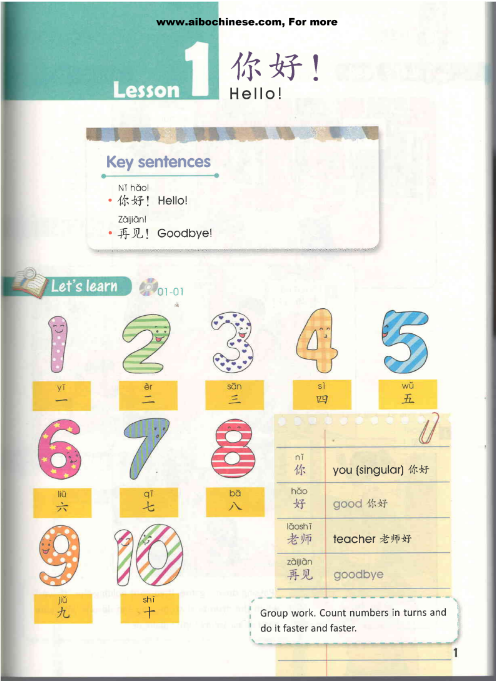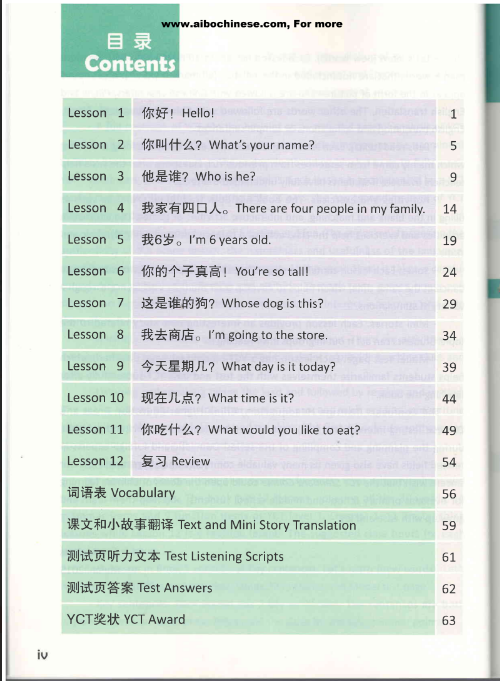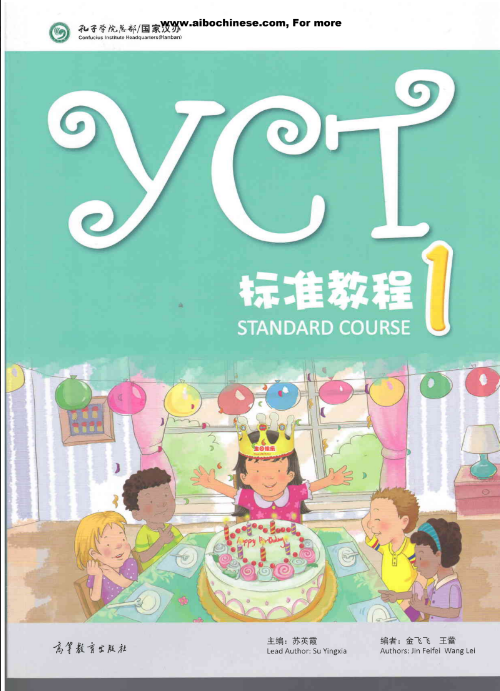Bên dưới đây mình có spoil trước 1 phần nội dung của cuốn sách với mục tiêu là để bạn tham khảo và tìm hiểu trước về nội dung của cuốn sách. Để xem được toàn bộ nội dung của cuốn sách này thì bạn hãy nhấn vào nút “Tải sách PDF ngay” ở bên trên để tải được cuốn sách bản full có tiếng Việt hoàn toàn MIỄN PHÍ nhé!



Lesson 4
我家有四口人。
There are four people in my family.
Key sentences
Ni jia you ji kou ren?
你家有几口人? How many people are there in your family?
Ni you didie ma?
你有姐姐吗? Do you have big sisters?
Let’s learn
baba
爸爸 father
mama
妈妈 mother
jia
家 family
gege
哥哥 big brother
jiejie
姐姐 big sister
meimei
妹妹 little sister
you
有 to have
有哥哥
ji
几 how many (within 10)
儿口人, 几个
kou
{a measure word for family members}
四口人
he
and
和爸爸和妈妈
*没有
méiyǒu
don’t have
没有哥哥
ge
{a measure word for general use}
一个姐姐, 哪个
How many big brothers and sisters do you have? Tell your partner.
14
Let’s chant
wǒ ài wǒ de jiā
我爱我的家
baba, baba, hǎo baba, wǒ ài hǎo baba.
爸爸, 爸爸, 好爸爸, 我好爸爸.
Mama, mama, hǎo mama, wǒ ài hǎo mama.
妈妈, 妈妈, 好妈妈, 我爱妈妈.
gege, gege, hǎo gege, wǒ ài hǎo gege.
哥哥, 哥哥, 好哥哥, 我好哥哥.
jiejie, jiejie, hǎo jiejie, wǒ ài hǎo jiejie.
姐姐, 姐姐, 好姐姐, 我爱姐姐.
wǒ ài wǒ de jiā, hēi, wǒ ài wǒ de jiā.
我爱我的家, 嘿, 我爱我的家.
wǒ ài wǒ de jiā, hēi, wǒ ài wǒ de jiā.
我爱我的家, 嘿, 我爱我的家.
Lesson 5
我6岁。
I’m 6 years old.
Key sentences
Nǐ jǐ suì?
你几岁? How old are you?
Nǐ gēge duōdà?
你哥哥多大? How old is your big brother?
Let’s learn
suì
岁 year(s) old 几岁
duō dà
*多大 how old 你多大?
yě
*也 also, too 他也6岁。
- Complete the form and then count from 1 to 100.
- How old are you? Circle the number and tell your partner.
Small survey
tóngxué de míngzi
同学的名字
classmates’ names
duō dà / jǐ suì
多大 / 几岁
baba
爸爸
mama
妈妈
gege
哥哥
didi
弟弟
little brother
meimei
妹妹
Interview 5 classmates. Ask their family members’ age, complete the survey and then present to the whole class.
Let’s sing
Lǎoshī: Nǐ jǐ suì?
老师: 你几岁?
Lǎoshī: Máilì, Máilì, nǐ jǐ suì?
老师: 玛丽, 玛丽, 你几岁.
Máilì: Bā suì. Bā suì, wǒ bā suì.
玛丽: 8岁. 8岁, 我8岁.
Lǎoshī: Dàwèi, Dàwèi, nǐ jǐ suì?
老师: 大卫, 大卫, 你几岁?
Dàwèi: Jiǔ suì, jiǔ suì, wǒ jiǔ suì.
大卫: 9岁, 9岁, 我9岁.
Lǎoshī: Máilì/Dàwèi, nín duōdà?
老师: 玛丽/大卫, 老师, 您多大?
Lǎoshī: Mímī, mímī, shǐ mímī.
老师: 秘密, 秘密, 是秘密, 是秘密~.
Lesson 6
你的个子真高!
You’re so tall!
Key sentences
Mèimei de yǎnjing hěn xiǎo.
妹妹的眼睛很小。 Little sister’s eyes are small.
Nǐ de gèzi zhēn gāo!
你的个子真高! You’re so tall!
Let’s learn
tóufa
头发 hair
bízi
鼻子 nose
shǒu
手 hand
yǎnjing
眼睛 eye
ěrdūo
耳朵 ear
de (indicating a possessive relationship) 妹妹的眼睛!
xiǎo
小 small 很小
dà
大 big
cháng
长 long 长不长
gèzi
个子 height (for people) 你的个子, 个子很高
zhēn
真 really 真长
gāo
高 tall 真高
Pair work. One student says a word and the other points to his/her own corresponding body part.
Let’s guess
Pair work. Make a guess and talk to your partner with the sentences below.
A: 这, 这是什么?
B: 这, 这是.
A: 这, 这是谁的?
B: 这, 这是.
Chinese culture
1972 1984 Rat
1973 1985 Ox
1974 1986 Tiger
1975 1987 Rabbit
1976 1988 Dragon
1977 1989 Snake
1978 1990 Horse
1979 1991 Sheep
1980 1992 Monkey
1981 1993 Rooster
1982 1994 Dog
1983 1995 Pig
These are the 12 Chinese zodiac animals. What is your animal sign? Your father’s? Your mother’s? Tell your partner.
shǔ: rat
niú: ox
hǔ: tiger
tù: rabbit
lóng: dragon
shé: snake
mǎ: horse
yáng: sheep
hóu: monkey
jī: rooster
gǒu: dog
zhū: pig
Nǐ jiějie zài jiā ma?
- 你姐姐在家吗?
Nǐ qù nǎr? - 你去哪儿?
Nǐ qù xuéxiào ma? - 你去学校吗?
Wǒ bù qù xuéxiào.
A. 我不去学校。
Tā bù zài.
B. 她不在.
Wǒ qù shāngdiàn.
C. 我去商店.
Let’s read and point
Bízi zài zhèr.
鼻子, 鼻子, 鼻子在这里。
Ěrdūo, ěrdūo, ěrdūo zài zhèr.
耳朵, 耳朵, 耳朵在这里。
Yǎnjing, yǎnjing, yǎnjing zài zhèr.
眼睛, 眼睛, 眼睛在这里。
Tóufa, tóufa, tóufa zài zhèr.
头发, 头发, 头发在这里。
Xiǎo shǒu, xiǎo shǒu, xiǎo shǒu zài nǎr.
小手, 小手, 小手在那儿。
Read the paragraph and point to the corresponding body parts of yourself or on the picture.
Lesson 9
今天星期几?
What day is it today?
Key sentences
- Ni de shēngri shì jǐ yuè jǐ hào?
你的生日是几月几号? When is your birthday? - Jīntiān xīngqī jǐ?
今天星期几? What day is it today?
Let’s learn
星期一
Xīngqīyī
星期一 Monday
星期二
Xīngqī’èr
星期二 Tuesday
星期三
Xīngqīsān
星期三 Wednesday
星期四
Xīngqīsì
星期四 Thursday
星期五
Xīngqīwǔ
星期五 Friday
星期六
Xīngqīliù
星期六 Saturday
星期天
Xīngqītiān
星期天 Sunday
Vocabulary
shēngri
*生日 birthday 你的生日
yuè
月 month 几月, 1月
hào
号 date 几号, 3号
jīntiān
今天 today 今天星期几?
xīngqī
星期 week 今天星期五。
míngtiān
明天 tomorrow 明天星期六。
xǐhuān
喜欢 to like 不喜欢, 很喜欢
Pair work. One student points to one picture and asks “今天星期几?”, and the other student answers the question according to the picture.
YCT 标准教程 Standard Course
Let’s read
- Ni de shēngri shì jǐ yuè jǐ hào?
你的生日是几月几号?
1月1号。
1 Yī yuè yī hào.
Question: 她的生日是几月几号? - Jīntiān xīngqī jǐ?
今天星期几?
3 Míngtiān xīngqīliù,
明天 星期六,
wǒ xǐhuān xīngqīliù.
我喜欢星期六。
Question: 他喜欢星期几? - Ask three friends about their birthday.
- What is your favorite day and least favorite day?


